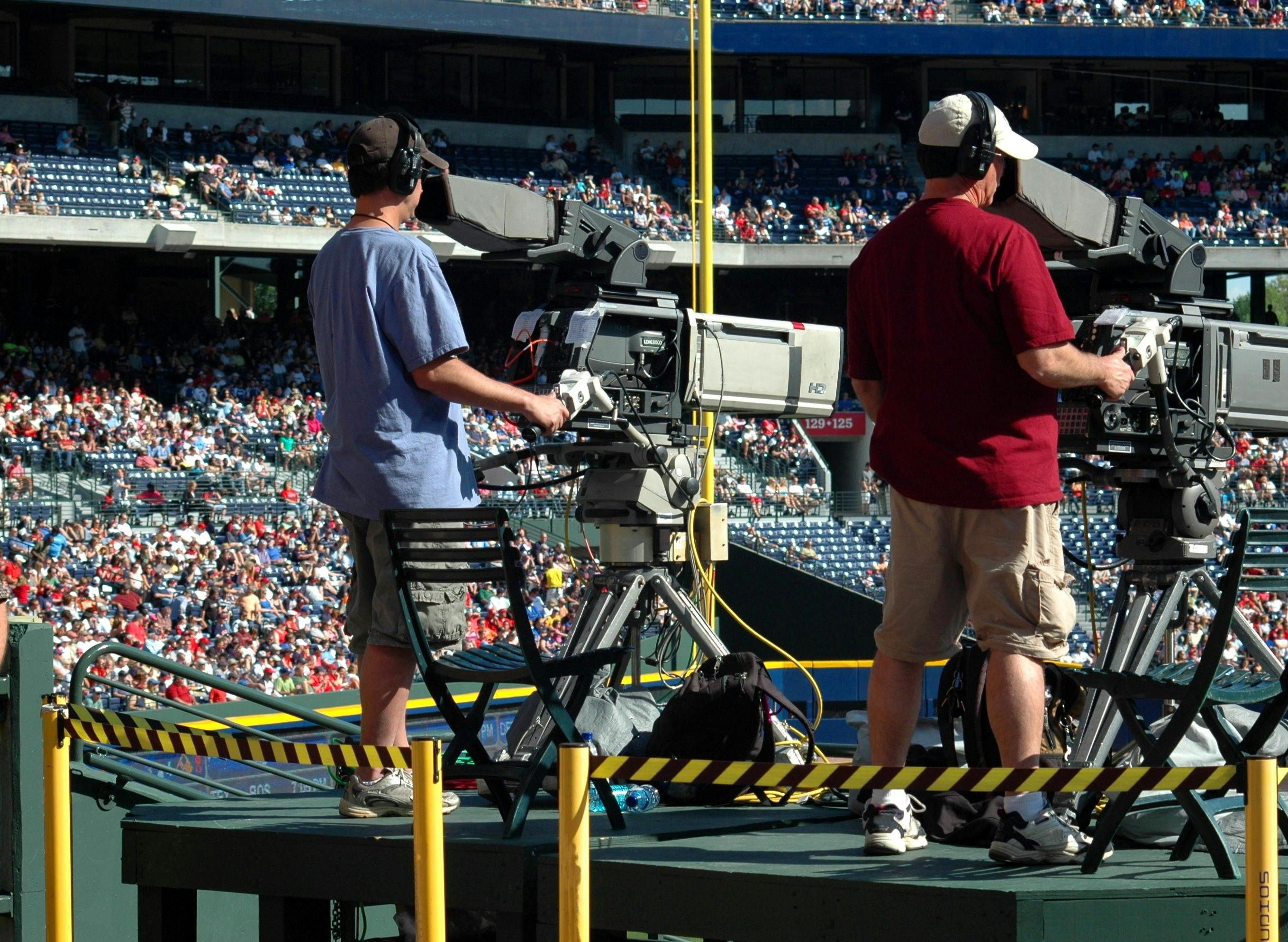A Deep Dive Into Fubo’s Lawsuit Against Disney, Fox, WBD; Stopping Joint Venture Might Be Only Chance for Sports Streamer’s Survival
Fubo co-founder and CEO David Gandler has called the forthcoming sports streaming service a “sports cartel” and “sports racketeering.”

When Disney, Fox, and Warner Bros. Discovery announced earlier this month that they were coming together to launch an unprecedented sports-focused streaming service, everyone across the sports and entertainment spheres was in a bit of shock. While bundling has certainly been an increasingly important aspect of the industry recently, the fact that three of the world’s largest media companies have joined forces to unite the majority of the country’s major domestic sports rights has quickly become an inflection point for many in sports and streaming. Chief amongst those opposed to the move is the sports-focused live TV streaming service Fubo and the company’s co-founder and CEO David Gandler.
Key Points:
- Fubo claims that it has been the victim of a coordinated campaign to harm its business for years.
- The streamer believes that it is negatively impacted by unfair bundling practices and excessive fees from content providers.
- CEO David Gandler has equated the Disney, Fox, and WBD joint venture to a cartel and racketeering.
On Tuesday, Fubo filed a lawsuit against Disney, Fox, and WBD alleging violations of antitrust laws limiting competition and choice. While many analysts believe that Fubo has a difficult legal journey to win the suit, Gandler has gone on the offensive in hopes of turning popular opinion to his streamer’s side. The Fubo executive has done multiple interviews this week and the company has launched savemysports.com as an outlet to share its side of the debate.
“This sports cartel blocked our playbook for many years and now they are effectively stealing it for themselves,” Gandler said in an open letter this week. “Silence is no longer an option. The fact that live sporting events dominated television viewership in 2023, with 97 of the top 100 broadcasts, highlights the critical importance of sports in entertainment and the necessity for its broad dissemination.”
There is no arguing that live sports are still the thing most driving people to watch live TV. In 2023, all but four of the top 100 shows on cable or broadcast television were sports with the NFL accounting for 93% of them. That was the motivating theory behind Fubo’s launch in 2015, to give consumers a place to watch sports while no longer being beholden to traditional pay-TV providers. However, in the intervening nine years, live TV streaming has been beset by the same issues, costs, and attrition that its cable and satellite forbearers were.
Gandler believes that because Fubo’s goal was to disrupt the streaming and broadcasting industries by focusing solely on sports, content owners that use sports to leverage higher carriage and retransmission fees for their entertainment products have sought to systematically undermine the streamer’s ability to do business.
What Are Fubo’s Complaints Against Joint Venture Sports Streamer?

Fubo CEO David Gandler
‘Unfair Bundling’ Practices
Fubo’s lawsuit positions this month’s announcement as just the latest move by Disney, Fox, and WBD designed specifically to not only kill sports broadcasting competition but to deliberately injure Fubo specifically, as it is the only major, independent, sports-focused domestic streaming service.
Gandler’s company claims that three media entities involved in the joint venture have engaged “in a years-long campaign to block Fubo’s innovative sports-first streaming business resulting in significant harm to both Fubo and consumers.” The streamer’s lawsuit alleges that the proposed sports-streaming joint venture “steals Fubo’s playbook,” after having effectively prevented the streamer from implementing it in the first place.
Fubo accuses the companies of engaging in unfair bundling practices, forcing it to carry channels that do not fit into its sports-focused brand. Across all of pay TV — be it cable, satellite, or streaming — channel owners require distributors to carry multiple channels, even if the service only wants a small handful of the offerings. This bundling ensures that the channel owners receive as much money in carriage fees as possible by securing distribution for less popular networks on the backs of those that are most in demand.
While this has been standard operating procedure in the industry since the dawn of the cable era, Fubo believes that it is specifically harmed by this practice, because it ideally would only carry channels that feature sports programming. Instead, Fubo currently is required to include entertainment-only channels like Disney Channel, Disney Junior, E!, Freeform, FX, HGTV, MTV, Paramount Network, SyFy, and others because they are owned by companies that also are responsible for broadcasting significant sports content. If Fubo wants ESPN, ABC, NBC, CBS, Fox, et al., it needs to take these other channels as well.
Fubo has not specified whether it would drop any or all of these types of channels should it have the opportunity, but in an interview with CNBC this week, Gandler certainly indicated that the streamer would look to shed as many non-sports channels as possible if it ever gets the opportunity.
Excessive Licensing Rates
In its lawsuit, Fubo is also claiming that Disney, Fox, and WBD are imposing excessive licensing rates on the streamer that far exceed those of its competitors, presumably in an effort to squash the potential of a sports-focused platform. Fubo claims that the companies are charging licensing rates at least 30% to 50% higher than those paid by other distributors.
“We have previously collaborated with each of these companies so that we could offer ‘must-have’ sports content to Fubo customers,” Gandler said. “For many years, they have challenged our business at every opportunity through pernicious practices. While other new competitors were prevented from entering the market, Fubo has continuously fought back. The Defendants’ unconscionable practices have impacted our ability to grow and have deprived consumers of a compelling and competitively-priced product.”
Additionally, Gandler’s company alleges that the defendants impose “non-market penetration requirements” on Fubo that eventually increase the cost of the service for customers. These requirements either put a floor or ceiling on the percentage of total subscribers that a certain content package can be sold to.
“These actions individually and collectively increase the costs Fubo must pass onto customers,” the company said in a statement. “Fubo believes it has incurred billions of dollars in damages as a result of the Defendants’ actions. “
Restricting Features

Additionally, Fubo claims that Disney, Fox, and WBD have instituted restrictions that prevent Fubo from offering “compelling streaming products that consumers would find desirable,” despite the fact that other traditional and streaming distributors offer them. While the company did not specify exactly what products and features those are, it did point out that some of them are available on platforms owned by the companies involved in the lawsuit.
Thanks to the Disney Bundle, Hulu has access to a cavalcade of sports rights that are normally housed on ESPN+. The NHL’s out-of-market package NHL Power Play is a part of the worldwide leader in sports’ streaming service, but the games also find their way over to Hulu for customers who subscribe to both services. This is also true for PGA Tour Live, which allows EPSN+ — and in turn Hulu — to broadcast extensive coverage of nearly all PGA events.
In an interview with Yahoo! Finance this week, Gandler discussed the fact that Hulu has an unfair advantage over Fubo when it comes to sports claiming that the cabal of media companies at the center of the joint venture are engaging on something approaching racketeering.
“We don’t have access to ESPN+,” Gandler said bluntly.
What Is Fubo Hoping to Achieve With Its Lawsuit Against Disney, Fox, Warner Bros. Discovery?

For all intents and purposes, Fubo is fighting for its life. With its subscriber total plateauing at roughly 1.5 million people — notwithstanding the cyclical nature of sports seasons — the company simply cannot afford to have even the tiniest fraction of its customer base siphoned off by either competing live TV streaming services or especially by direct-to-consumer services that have the ability to dramatically undercut Fubo’s pricing.
With The Streamable confirming that Disney, Fox, and WBD’s streaming service will also carry full, around-the-clock livestreams of entertainment-first channels ABC, Fox, TBS, TNT, and truTV, there might just be enough non-sports options available to make leaving a traditional pay-TV distributor live Fubo behind for good. In The Streamable’s expert analysis, the joint streaming venture will cost between $40 and $50 per month (likely on the higher end), so if a cord-cutting sports fan adds the premium tiers to Paramount+ and Peacock for $11.99 to get all of the sports content available on those platforms, they would be paying at most $74 monthly for nearly every available live sports broadcast.
The one programming advantage that Fubo would have over this piecemeal option is that it does carry regional sports networks (RSNs) that would not be available by stacking those three platforms. Although, there is the possibility that Amazon's investment in the Diamond Sports Group could make the Bally Sports RSNs more readily accessible as well. However, even without those sports channels, consumers would get the vast majority of live sports in the United States for at least $18 less per month than a Fubo subscription; over the course of one year, this would save them over $216. While $74 is not cheap, a price like that would make it nearly impossible for Fubo to continue operating given current economic realities.
“By combining to license their must-have sports content on a standalone basis to their own joint venture, other distributors, including Fubo,” the streamer said, “would be at an extreme competitive disadvantage to the detriment of millions of U.S. consumers.”
In its complaint, one of the items that Fubo hopes to achieve is to require Disney, Fox, and WBD to create “economic parity of licensing terms” and for the courts to impose “substantial damages from the Defendants.”
It seems clear that Fubo’s ultimate hope is to prevent the sports joint venture from ever coming to market — and it is hoping that the Department of Justice and the NFL can assist along the way. While in many circumstances, getting some sort of extra benefit from the three companies — similar to Disney granting Spectrum customers access to Disney+ — might be enough to end the lawsuit, that almost certainly won’t be enough to save Fubo in this case.
“Fubo seeks equal treatment in terms of pricing and all relevant conditions from these media giants to ensure we can compete fairly for the benefit of consumers,” Gandler said. “Our customers deserve access to a competitively priced offering with innovative features designed by Fubo for an unparalleled sports viewing experience.”
While Gandler and his company are rightly concerned about how a move like this would impact consumers, make no mistake about it, the lawsuit and all of their objections and accusations are about keeping Fubo in business. As the economics of entertainment and streaming continue to shift, the creation of Disney, Fox, and Warner Bros. Discovery’s streaming sports joint venture could be the final straw for Fubo’s backbreaking efforts to reinvent sports streaming.
Fubo
Fubo is a live TV streaming service with about 90 top channels that start at $79.99 per month. This plan includes local channels, 19 of the top 35 cable channels, and regional sports networks (RSNs). In total, you should expect to pay about $91.99 per month, after adding in their RSN Fee. Fubo was previously known as “fuboTV.”

